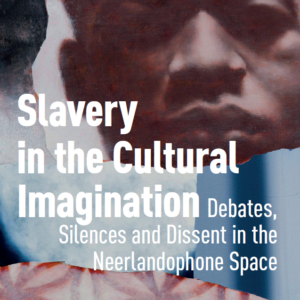
On Thursday 6 November, Framer Framed hosts an evening organised by historian Karwan Fatah-Black and literary scholar Marrigje Paijmans, addressing the following questions: How do we imagine the past of colonialism and slavery today? Which artists, genres, media and languages are speaking out about these legacies – and which remain silent? Is the topic of colonialism open to dialogue, empathy and change? How can language and creativity drive the process of transformation?
Join this evening symposium to celebrate the publication of the co-edited volume Slavery in the Cultural Imagination: Debates, Silences, and Dissent in the Neerlandophone Space (2025), edited by Karwan Fatah-Black and Marrigje Paijmans. This event features creative and scholarly work that engages with the legacies of colonialism and push for social and cultural change. The focus is on the Neerlandophone space: the complex linguistic space spanning both the Netherlands and former Dutch colonies.
The evening includes presentations by media and culture scholar Arnoud Arps, artist Buhlebezwe Siwani and poet Bernice Vreedzaam, whose work actively contributes to rethinking the colonial past and reimagining the future. Following their individual presentations, they engage in a panel discussion with the audience on the role of creativity and language in decolonial efforts. The discussion is moderated by the editors of the Slavery in the Cultural Imagination volume Karwan Fatah-Black and Marrigje Paijmans.
Join for an evening of inspiration and dialogue, wherein the roles of art, language and creativity in confronting the legacies of colonialism are explored. Register here.
Note: The program is conducted in English, though some elements may be presented in Bahasa Indonesian, isiXhosa, Sranan, or Dutch.
You will also have the chance to see the exhibition Shapeshifters: On Wounds, Wonders and Transformation. This group exhibition brings together works by al-yené, Antonio Jose Guzman & Iva Jankovic, Georges Senga, Kader Attia, Kosisochukwu Nnebe, Leah Zhang, Pei-Hsuan Wang, Sammy Baloji & Cécile Fromont, Mirelle van Tulder and Anna Safiatou Touré. Together, their practices examine how colonialism has shaped the ways museums, archives and other institutions of knowledge are perceived and understood, revealing the (im)material scars imposed by systemic violence.
About
Arnoud Arps is a media and culture scholar at the University of Amsterdam, specialising in contemporary representations of Indonesia’s colonial past in Indonesian and Dutch popular culture. Arps will demonstrate how short films by young film makers from the Indonesian-Dutch nexus exemplify what the postcolonial Neerlandophone memory of colonial Indonesia has become and where it is headed.
Buhlebezwe Siwani is a visual artist that lives and works between Cape Town and Amsterdam. She works with performance, photography, sculpture, and installation to touch social and political topics, such as the female body, Black communities, histories of colonisation and the paradoxes of our contemporary society. She is shortlisted for the Prix de Rome (2025), the pre-eminent incentive award for talented visual artists from the Netherlands. Siwani will screen her choreography Ulwela Amaza (created in collaboration with Rozenstraat, A rose is a rose is a rose), which uses dance as a method for communication about a history that is always lived and in motion.
Bernice Vreedzaam is a writer of poetry, audio stories, cinepoetry, among many other genres. Whether it concerns Surinamese polyphonic loudness or meditative silence, language in her work is a medium for making connections. Vreedzaam reads poetry from her recently published debute De vogelgrens oversteken.
Karwan Fatah-Black is a historian at Leiden University, specialising in Dutch Colonial History. The early modern Atlantic world is the context for his study of the transformational effects of globalization on society. Fatah-Black organised the event and moderates the panel discussion.
Marrigje Paijmans is a literary scholar at the University of Amsterdam focusing on the intersection of colonialism and ecology through the lens of water. Paijmans organised the event and moderates the panel discussion.
Credit requirements and registration
Students who wish to participate can earn 1 ECT. In order to do so you are required to
- visit the event and
- read the introduction and one chapter of your own choice from the book Slavery in the Cultural Imagination: Debates, Silences, and Dissent in the Neerlandophone Space, edited by Marrigje Paijmans and Karwan Fatah-Black (open access).
If you would like to register or if you have any questions, please, contact Marrigje Paijmans ([email protected]).
Artwork on featured image: Dion Rosina, Is It a Dream? (2023).